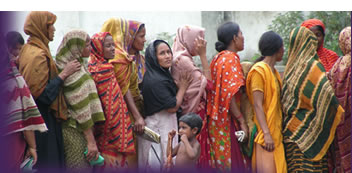|
|
|
| Enterprise Groups |
Enterprise Groups in Prakasam district, Podili Mandal
Sericulture:
In Cumpalapadu village, some farmers are taking up sericulture as a major activity. In this village, we interviewed a women farmer Smt. Ramanamma, (W/o Srirama Reddy) who is successfully 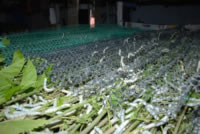 undertaking a cocoon production unit. She has 2 acres of land with a bore well. Due to continuous drought conditions prevailing in the district, she has had to overcome many constraints in farming. At that time (2003-04), the Department of Sericulture was promoting mulberry crop production through technical training and provision of financial incentives. The Department organised exposure visit to places where sericulture is practised traditionally such as Chittor, Palamaneru, Kuppam and Gobichettipalayam with the financial assistance of ATMA. In this exposure visit Ramanmma’s husband also joined and he gained experience on mulberry cultivation.
With the experience gained by her husband and with the financial assistance (subsidies) and and technical inputs from the Department of Sericulture, they planted mulberry in 1.00 acre in 2004. She also constructed a silkworm rearing shed and purchased rearing equipment In the first year, 2004-2005, she earned Rs. 40,000/ on the crop. Now, she is able to earn Rs. 15,000 every two months, the cost of production being Rs. 6,000/ and the net income being Rs. 9,000.
Seeing the success of this enterprise, more farmers in the village have taken up the sericulture activity. She was selected as the best women silkworm rearer of Prakasam district for the year 2006-07 and was awarded in the “Sankranthi Sambaralu” function organised by the State Government in2007 by the district Collector.
The Sericulture Department had provided the timely technical, financial assistance and back-up support for this activity to be a success. Though the Department has been trying to promote this activity in the district, it was taken up only by a few farmers. The major problem they face is marketing. They are currently marketing the cocoons in the markets of Madanapalli, Hindupur, Guntur, Vijayawada etc.
The sericulture growers suggested that formation of sericulture farmers into one society will be ideal for addressing their marketing problems and other problems. The establishment of reeling centres was also suggested so that the farmers could sell their produce locally. Quality deterioration has been reported during transport and so less price is achieved in the market. Because of this problem they are forced to sell their produce in the nearby markets for low price.
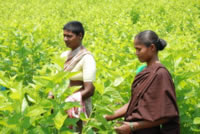 The farmers also expressed the need for improved storage bins like plastic bins to avoid transport losses. But they are costly and so they can’t afford to buy it. They require training in good silk worm rearing techniques, mulberry cultivation practices, disease management etc. Cocoon marketing facilities are to be organised locally (Ongole itself), so that they don’t have to travel to distant places to transport cocoons and they get better prices. Basically all the logistical support for this activity needs to be made available or at least the farmers need to be assisted to access these different services.
The sericulture activity is practised only on an individual level and not as a group activity. And also the initial investment of constructing the rearing shed has to be borne by the farmers itself. They are eligible to get the subsidy once the foundation of the rearing shed is completed. The high fluctuations in cocoon prices are currently discouraging farmers from expanding this activity. The farmers feel that the Government has to take necessary policy decisions to safeguard them from the imports of China Silk. Marketing know how should be provided for women with proper incentives. There is also need to provide training to the farmers on bivoltine rearings and other high yielding techniques. Institutional financial assistance can be given to attract more farmers to participate enthusiastically and effectively in sericulture |
|
|
Neem Seed Collection as Group Activity -Cumpalapadu |
In Cumpalapadu, Balguruvamma, the Mandal Samakhya Secretary heads the ten members “Sonia” group. This group is involved in neem seed collection activity. They collect neem seeds during the the seasons from nearby places. They employ themselves as labour in the activity and they engage one labour daily for other works such as transporting etc. They have been involved in the collection of neem seeds for 1 month. Male labourer is paid Rs. 50/day and the female labourer is paid Rs. 30/day. To provide their wages on day today basis the group has got a loan from the Village Organisation.
 Once the seeds are collected proper measures are taken for drying the seeds, avoiding sun, showers etc. In one month the group collects 8 tonnes of seeds. The seeds are sold to a Guntur based company at the rate of Rs. 5/kg of seeds. Sometimes they sell the green seeds at the rate of Rs. 30-40/tin which approximately comes to Rs. 2.50 to 3.0/kg. Once the seeds are collected proper measures are taken for drying the seeds, avoiding sun, showers etc. In one month the group collects 8 tonnes of seeds. The seeds are sold to a Guntur based company at the rate of Rs. 5/kg of seeds. Sometimes they sell the green seeds at the rate of Rs. 30-40/tin which approximately comes to Rs. 2.50 to 3.0/kg.
Training was given to the group members on neem seed collection aspects at Cuddapah by the IKP. They were trained on selection of fruits, drying aspects etc. In one month out of eight tonnes of seeds, they get Rs. 7,000/- as profit. The expenditure incurred comes to around Rs. 5,000-6,000 which includes auto transport, labour charges etc. The profit is given to the Village Organisation.
After 1 or 2 times, the Village Organisation could not lend the women loans because of fund shortage and they stopped this as a group activity. But knowing the profit in the business some women in the group are actively engaged in the collection of neem seeds gaining a profit of Rs. 5,000/- per year. If this group can get short term loans (working capital) from the village organisation or any other source (at reasonable interest), they can continue this activity.
|
Collection of Nalleru (Edible Stemmed Vine) Cissus quadrangularis – Mallavaram Village
This activity was taken up by the motivation of IKP in the village Mallavaram at Podili Mandal. To get involved in this activity, the interested groups needs to join in the Village Organisation by paying a share capital of Rs. 1,000 and Rs. 500. In the nearby wastelands and forests, nalleru exists as natural growth. This can be cut, dried and sold to the pharma companies from Vijayawada and Guntur. They would have to dry 4 kg raw nalleru to get 1 kg of dried nalleru. The profit gained out of this activity is given to the Village Orgainisation and it is shared by the groups who have paid the share capital. When a particular group wants to withdraw its share, they will be given Rs. 1,000 along with the interest and the profit share of that period.
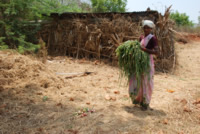 About 20 groups of this village are involved in the procurement (collection) of Nalleru from the Purambokku wastelands. The Companies offer Rs. 14-16/kg for dried Nalleru. The rate depends on the quality of the produce. In this way, all the groups who paid the share capital to take up the activity collected 8 tonnes of Nalleru in a month’s span. The labour wages are paid taking loan from the Village Organisation. In this village, the groups have taken loan to an amount of Rs. 60,000/ from the Village Organisation. All the 20 groups from the village are actively involved in the collection, cutting, drying of Nalleru. All the 200 members of the 20 groups are able to get continuous employment for about a month. They are paid Rs. 30/member as wage amount. They have kept the stock ready to be taken by the Pharma companies. Once the profit is ascertained they would decide whether the same activity can be continued or not. About 20 groups of this village are involved in the procurement (collection) of Nalleru from the Purambokku wastelands. The Companies offer Rs. 14-16/kg for dried Nalleru. The rate depends on the quality of the produce. In this way, all the groups who paid the share capital to take up the activity collected 8 tonnes of Nalleru in a month’s span. The labour wages are paid taking loan from the Village Organisation. In this village, the groups have taken loan to an amount of Rs. 60,000/ from the Village Organisation. All the 20 groups from the village are actively involved in the collection, cutting, drying of Nalleru. All the 200 members of the 20 groups are able to get continuous employment for about a month. They are paid Rs. 30/member as wage amount. They have kept the stock ready to be taken by the Pharma companies. Once the profit is ascertained they would decide whether the same activity can be continued or not.
So far, nalleru is cut manually, but the women feel that availability of suitable machines to cut nalleru would help them to reduce the drudgery. To take up the cutting operations and for stocking the material until it is taken by the Pharma companies, they require proper infrastructure (with rood inorder to protect from heat and rain) such as provision of a particular place in the village. As of now, they have stocked the dried nalleru in a place for which the Village Organisation is paying a rent of Rs. 100/month.
The groups have not undergone any specific training for this Nalleru collection and cutting. Lack of proper infrastructure facilities (lack of storage sheds), lack of proper buy back mechanisms limit the continuity of the programme. |
Dairying- Aamudalapallli Village
Prakasam is well known for its successful dairy industry. Most farmers her are engaged in dairying for additional/alternate income. Many women are engaged in dairying but all women are practicing it as an individual activity. We interacted with one women group “Joshua group” of Aamudalapalli Village of Podili Mandal. Almost all the members are keeping one or two buffaloes. This group is formed by IKP, Podili. All the members of this group are agricultural labourers. IKP gave Rs. 10,000 as Community Investment Fund to each individual member and some of the members purchased dairy animals. Some group members added Rs. 5,000/ to their share of the Community Investment Fund and bought a good breed of buffalo. Some of them managed to get a local breed out of Rs. 10,000/- given as CIF.
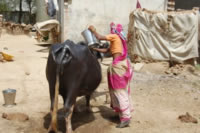 All the members are employed in this activity for just 2 to 3 hrs/daily as they are having only one or two buffaloes. Rest of the time is spent as agricultural labourer. They leave the animals for free grazing. Apart from that they feed the animals with paddy straw and some other concentrates. Some members own land in which they raise fodder in a small piece of land. Approximately, they spend Rs. 15/day on roughages and concentrates. From each buffalo they are able to get 4 litres/daily: two litres in the morning and two litres in the evening. There are so many Government and private dairies concentrated in and around Prakasam district. Many private milk societies come to this village and take the milk. Most of the group members sell their milk to Ramakrishna Milk Dairy. The price varies from Rs. 14 to Rs. 23/litre depending upon the fat percentage. The rate of milk is Rs. 12-14 if it contains 4-5% of fat and Rs. 23 if the fat content is 10%. They get the dry fodder (paddy straw) from distant places when it is not available locally at the rate of Rs. 3000/load. Concentrates such as oil cakes, rice bran and jaggery are bought in Podili whenever needed. All the members are employed in this activity for just 2 to 3 hrs/daily as they are having only one or two buffaloes. Rest of the time is spent as agricultural labourer. They leave the animals for free grazing. Apart from that they feed the animals with paddy straw and some other concentrates. Some members own land in which they raise fodder in a small piece of land. Approximately, they spend Rs. 15/day on roughages and concentrates. From each buffalo they are able to get 4 litres/daily: two litres in the morning and two litres in the evening. There are so many Government and private dairies concentrated in and around Prakasam district. Many private milk societies come to this village and take the milk. Most of the group members sell their milk to Ramakrishna Milk Dairy. The price varies from Rs. 14 to Rs. 23/litre depending upon the fat percentage. The rate of milk is Rs. 12-14 if it contains 4-5% of fat and Rs. 23 if the fat content is 10%. They get the dry fodder (paddy straw) from distant places when it is not available locally at the rate of Rs. 3000/load. Concentrates such as oil cakes, rice bran and jaggery are bought in Podili whenever needed.
The Village Organisation is currently making efforts to start up a milk collection centre locally. They don’t face any problem with veterinary assistance as they are able to access the assistance of a veterinary doctor at periodical intervals and also whenever they are in need. However, lack of sufficient amounts of green fodder is constraining this activity as the milk produced without adequate quantity of green fodder, has a low fat content, which in turn lowers the price. Many people have started selling off their buffaloes because of the non-availability of green fodder. (Migration is an important coping mechanism in the area and the women go to Hyderabad and Nandyala in search of livelihoods in off seasons. They go for masonry works, road construction works etc). The women are not happy with the price of milk they are receiving now. They would like to get training on aspects like clean milk production, selection of breeds and value addition of milk. They realise that dairying would be more successful if it is organised as a group activity. They also observed that the loan amount is not sufficient to buy a good breed.
Goat Rearing
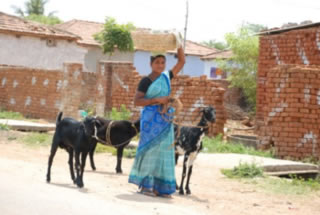 Goat rearing is not taken up as group activity. This is taken up as an individual activity. Hosalapadu Miriamma is the leader of the Yesiah group. Only 2 members of this group are rearing goats. Each member owns 4 goats. Since they have been bought, they gave birth to kids 4 times; 2 per birth. They kids were sold in Podili market. They all leave the goats for free grazing for which Rs. 50/ month/goat should be paid to the owner of the field. They can sell their 4-6 months kids for Rs. 1,000/. Once in a year they will sell the kids. There is high mortality in the case of goats. Some may survive and some may not. So income is not assured. As most of the people are agricultural labourers, they don’t get year round employment and so for an extra income they are involved in goat rearing. Goat rearing is not taken up as group activity. This is taken up as an individual activity. Hosalapadu Miriamma is the leader of the Yesiah group. Only 2 members of this group are rearing goats. Each member owns 4 goats. Since they have been bought, they gave birth to kids 4 times; 2 per birth. They kids were sold in Podili market. They all leave the goats for free grazing for which Rs. 50/ month/goat should be paid to the owner of the field. They can sell their 4-6 months kids for Rs. 1,000/. Once in a year they will sell the kids. There is high mortality in the case of goats. Some may survive and some may not. So income is not assured. As most of the people are agricultural labourers, they don’t get year round employment and so for an extra income they are involved in goat rearing.
The women should be trained on complete goat management practices including selection of breeds, feeding and veterinary assistance so that they could turn this into a viable livelihood option. However, the opportunity and support is not there and so they are taking up this business based on their experience and not because of any proper training.
Darsi Mandal
Lemon Grass Distillation Unit-Ganapathipuram Village
This enterprise is owned by Vinayaka Group which was formed in the year 2003. Mrs.B.Nagooramma is the leader of the group. Most of the members of this group are agricultural labourers. They have taken up 10 acres of land for lease and started growing lemon grass. The lease value of the land is Rs. 4,000/acre. Under the convergence scheme both IKP and DWMA granted Rs. 1,00,000 as loan through bank linkage. For one acre the cost of cultivation is approximately Rs. 10,000/- This is the expenditure incurred at the initial stages and they expect the expenditure to come down in the coming years.
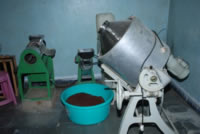 Cutting of grass starts at 90 days and cutting can be done once every 90 days. From one acre they get 4-5 tons of grass out of which 30-35 litre of oil is extracted. They have their own oil distillation unit. The oil is sold for Rs. 420/ litre. They have a buy back arrangement with the Balaji Medicinal and Aromatics Company from Satyanapalli near Guntur. The group sometimes get demand from companies located at Chennai and Bangalore for their produce. Cutting of grass starts at 90 days and cutting can be done once every 90 days. From one acre they get 4-5 tons of grass out of which 30-35 litre of oil is extracted. They have their own oil distillation unit. The oil is sold for Rs. 420/ litre. They have a buy back arrangement with the Balaji Medicinal and Aromatics Company from Satyanapalli near Guntur. The group sometimes get demand from companies located at Chennai and Bangalore for their produce.
The same group has got subsidy from the Horticultural Department to set up the distillation unit to a tune of Rs. 40,000/. They have paid back the loan given by the DWMA and the group members are the proprietors of the unit. They got the technology from the Horticultural Department. They are able to give trainings to other members who are interested to take up the business. This is a case of a successful group activity, which can be potentially promoted to many others but it remains successful only in small pockets of the district.
The group has also received again Rs. 1, 00,000 as bank linkage to take up dairying. From the share of Rs. 20,000/-, each member purchased buffalo (es) and the members are now selling the milk to Mohan milk line which is run by one of the Village Organisation leader. The members are able to get Rs. 1,500/- per month as profit.
Manufacturing of Drying Sheets and Hiring - Thurpu Venkatapuram
This business is done by Venkateswara Group, which started in the year 2003. The leader of the group is M.Veeramma and she is the leader of the Village Organisation. From the Village Organisation they borrowed a loan of Rs. 10,000/ initially to take up the business. With that amount they could manage to buy the raw materials (Plastic sheets) needed to produce the drying mats. The drying mats are hired out for drying at the time of harvest. For 1 carpet, the hire charges are 2kg of paddy/carpet if in kind or Rs. 8/carpet if it is in cash. For drying redgram the rent is Rs. 5/carpet.
There is full demand for the carpets for three months in a year. They are in demand at the time of paddy harvest, redgram harvest chillies harvest etc. The raw material needed for the carpets are bought from Narasaroapet or Guntur. They are bought in bales and they engage tailors to stitch them into carpets. Some members of the group also get involved in the stitching process as labour. From 1 bale of raw material they are able to get 3 carpets and 1 bale costs about Rs. 600. To make 3 carpets from 1 bale of raw material the cost involved is around Rs. 900.
At the time of harvest of chillies there will be season for 2 months. At a time at least 500 bales of raw material can be bought from Guntur to avoid repeated transport charges. To transport 500 bales at a time from Guntur they have to incur Rs. 2,000/-. For 500 bales-the material cost and stitching charges come around Rs. 50,000/- Then the carpets can be used effectively for 3 years. Approximately the demand for the drying sheets is for around 6 months from which they could get Rs. 1,00,000/ in which Rs. 60,000/ would go for labour charges who are involved in cleaning and drying of the produce. Two SHG group leaders are actively doing this business in partnership. This business provides continuous employment for 5 persons.
Goat and Sheep Rearing: Lankojanapalli Village
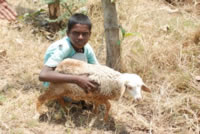 The Lakshmi group was formed in the year 2003 by the DWMA. All the members are agricultural labourers. In this group, one member is rearing both goat and sheep. She is maintaining 15 goats and 6 sheeps. The cost of sheep is higher than goats. The women leave them for free grazing from morning to evening in the nearby wastelands. At the time of calving/delivery, they will be fed with grains of sorghum, cumbu etc. The Lakshmi group was formed in the year 2003 by the DWMA. All the members are agricultural labourers. In this group, one member is rearing both goat and sheep. She is maintaining 15 goats and 6 sheeps. The cost of sheep is higher than goats. The women leave them for free grazing from morning to evening in the nearby wastelands. At the time of calving/delivery, they will be fed with grains of sorghum, cumbu etc.
Once in six months, from 15 goats and 6 sheep she earns Rs. 25,000/ to 30,000/. The income depends upon the number of kids born. Veterinary assistance is sought only when the animals fall sick. Otherwise out of their experience, they will administer the medicines themselves. The cost incurred by her for all goats and sheep is between Rs. 3000-4 000/year and it is for the grains to be fed at the time of calving and for the medicines. Mortality of kid goats is the major problem, and she clearly requires technical support to deal with this problem.
|
Enterprise Groups
Pudukkottai district
Thiruvarangulam Block
Mushroom Cultivation of Mullai Arumbu Group
The SHG Mullai Arumbu was formed in 2000 by the local NGO called TREES, at Kotthakkottai village of Thiruvarangulam block. This was co-ordinated by District Rural Development Agency. The group is being managed efficiently by its leader Tmt. Pragathambal, who is very energetic and positive. She is 38 years old living in the same village with her husband and children. Her husband is working in a Government Office in a slower cadre. Earlier she used to work as an agricultural labourer, but she could not find employment daily. Running the family was a real struggle for her then due to financial distress. After joining in the SHG, the group she started to save Rs. 20/month and was able to rotate the savings for petty personal requirements.
 At that time, the District Rural Development Agency gave trainings on various aspects to the SHG members through the local Krishi Vigyan Kendra, Vamban. Smt Pragathambal being the leader of the group attended many of such job oriented training programmes and was keen in transferring this knowledge and skills to the rest of the members. After attending these training programmes, she decided to take up self-employment to generate more income and she opted to go for mushroom cultivation. After a certain point of time she also entered into value added mushroom products preparation. Her group members are also involved in these enterprises. At that time, the District Rural Development Agency gave trainings on various aspects to the SHG members through the local Krishi Vigyan Kendra, Vamban. Smt Pragathambal being the leader of the group attended many of such job oriented training programmes and was keen in transferring this knowledge and skills to the rest of the members. After attending these training programmes, she decided to take up self-employment to generate more income and she opted to go for mushroom cultivation. After a certain point of time she also entered into value added mushroom products preparation. Her group members are also involved in these enterprises.
In the initial stages she found difficulties in selling mushroom and its products. Then she tried to sell it in DSMS office premises, set up by the DRDA for selling the products of SHGs. She and her group are maintaining a separate shop to sell the value added mushroom products. Because of the hygienic preparation, the products are very popular among people. Seeing the demand for the mushroom and its products, she has expanded the unit along with her group members. From the mushroom unit, she gets a net profit of Rs. 3,000/-per month. The group also got a bank loan to expand the business. The group members are spending half of the day when the beds are prepared. The group needs training on improved storage practices, drying etc. One major constraint is the availability of good quality spawn for mushroom production. They would like to get training on low cost spawn production under hygienic conditions.
The same group is engaged in bee keeping in the same premises. They are maintaining four hive boxes out of which they earn Rs. 8,000/year. Once in two months they get 2-3 litres of honey and they are selling the same for Rs. 400/litre. The group is engaged in bee keeping on their own, though they are not technically trained by any of the agencies.
Proper marketing and technical support can make these enterprises much more profitable.
Dairying: Kothakkottai Village
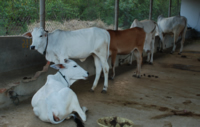 Some members of Asaiba group of Kothakkottai and some members of TANWABE group own cows. Many of these SHG members (whether they own land or not) maintain 1-3 cows independently depending upon their capacity. The cost of the cows vary between Rs. 10,000 to 12,000/. They sell for Rs. 10-12/litre of milk. Some members of Asaiba group of Kothakkottai and some members of TANWABE group own cows. Many of these SHG members (whether they own land or not) maintain 1-3 cows independently depending upon their capacity. The cost of the cows vary between Rs. 10,000 to 12,000/. They sell for Rs. 10-12/litre of milk.
Though some of the SHG members underwent training on dairy management practices, they are not following any specific feed management practices. They leave the cows for free grazing. They feed some concentrates which costs for Rs. 20-30/day. Paddy straw is available locally. Immediate veterinary assistance is sought locally. During summer, the cows often get affected by diseases, and then they treat them based on their experience. They are reluctant to take the animals to the veterinary hospitals because of practical constraints (transport, money, time of veterinary hospitals etc)
Some members bought cows from bank loans facilitated by the local NGOs or taking loan from the group fund. Since many of the members are landless, availability of fodder major is a problem. The group members are keen to access the community pasturelands, but these lands are currently degraded. The milk is sold in the village itself. There is no organised milk society or dairy in the area.
The women need training on clean milk production, preparation of rations for quality milk production and treatment of animals in case of emergency. Organising them as a milk society and linking them to dairies would help them in accessing better services and availing better prices.
TANWABE Group: Village: Thirukkattalai Village
This group was formed in 2006 by the Department of Agriculture at Thirukkattalai Village of Thiruvarankulam block. The group members are saving Rs. 50/month approximately. Some members of the group own pieces of land and almost all the group members are mainly agricultural labourers. They have attended training programmes organized by the Department of Agriculture on different income generating activities like vermicompost production, dairying etc.
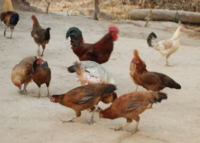 Recently by availing bank loan, three members of the group started poultry farming. They bought the chicks locally. They leave the chicks in open spaces. At present they are maintaining 10 birds. The members are spending 2-3 hrs of work in bringing up the birds. They require training on disease management aspects of poultry farming. Because of the recent bird flu scare, people are afraid of taking up this activity as an enterprise. But these women can be trained on rearing chicks in proper shelters so that diseases and other manual disturbances will not be there. The women currently do not have the resources and know how to rear chick scientifically. But with the provision of proper financial assistance and effective follow up by technical staff, they can make poultry as a major livelihood option. Recently by availing bank loan, three members of the group started poultry farming. They bought the chicks locally. They leave the chicks in open spaces. At present they are maintaining 10 birds. The members are spending 2-3 hrs of work in bringing up the birds. They require training on disease management aspects of poultry farming. Because of the recent bird flu scare, people are afraid of taking up this activity as an enterprise. But these women can be trained on rearing chicks in proper shelters so that diseases and other manual disturbances will not be there. The women currently do not have the resources and know how to rear chick scientifically. But with the provision of proper financial assistance and effective follow up by technical staff, they can make poultry as a major livelihood option.
Currently, they are spending about Rs. 500-1,000 towards feed and health care. During winter seasons, the chicks are frequently affected by several diseases for which they are finding it difficult to get the needed medical help. In some cases they are treating the chicks on their own based on their experiences. The women have to be given exposure on the vaccinations and food rationing aspects. They would like to go on exposure visits to one of the successful poultry farms to learn about these aspects. The members have started the activity very recently and the income and profit are yet to be ascertained.
Vegetable Production:i- Asaiba Mahalir Group
Village: Kothakkottai
Block: Thiruvarangulam
This group comprising agricultural labourers was started in the year 2000. Some members join together and took land on lease to cultivate vegetables. They are growing brinjal, bhendi, green leaves and other vegetables and sell the same in local village and nearby towns. The members find full employment during the seasons. Each of the members spent approximately 5-6 hours every day in the field doing various activities
|
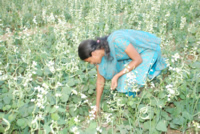 They buy seeds in the local market raise their own nursery (wherever needed) and do planting in the main field. The women are cultivating vegetables based on their own experience. They need training on proper pests and disease management of vegetable crops. They also need training on vegetable seed production so that they can produce quality seeds on their own. They earn a net profit of Rs. 2,000/ month after meeting out the expenses and the members share the benefit.. They are also interested to explore organic cultivation of vegetables. The women also maintain vermi-compost pits for use in their fields and the surplus is sold to other farmers. For the maintenance of one vermi-compost pit they are spending Rs. 250 which included the worms cost. They collect the waste material from their fields and cow dung from their livestock and allow for decomposition. They get a profit of Rs. 700 in one harvest i.e. for 3 months after meeting out all the expenses. But they are not following any scientific method of vermi-compost preparation. Training on proper scientific methods of vermi-compost would help them in doing this better. They buy seeds in the local market raise their own nursery (wherever needed) and do planting in the main field. The women are cultivating vegetables based on their own experience. They need training on proper pests and disease management of vegetable crops. They also need training on vegetable seed production so that they can produce quality seeds on their own. They earn a net profit of Rs. 2,000/ month after meeting out the expenses and the members share the benefit.. They are also interested to explore organic cultivation of vegetables. The women also maintain vermi-compost pits for use in their fields and the surplus is sold to other farmers. For the maintenance of one vermi-compost pit they are spending Rs. 250 which included the worms cost. They collect the waste material from their fields and cow dung from their livestock and allow for decomposition. They get a profit of Rs. 700 in one harvest i.e. for 3 months after meeting out all the expenses. But they are not following any scientific method of vermi-compost preparation. Training on proper scientific methods of vermi-compost would help them in doing this better.
Sericulture Activity: Vengidakulam Village
 Most of the work in mulberry cultivation is carried out by women. The FIG (farmer interest group) formed by the Department of Sericulture, comprises only men but the most of the work is done by the women only. They received subsidy of Rs. 40,000 from the Department of Sericulture. ATMA facilitated the formation of Farmers Interest Groups and trainings. All the members are small and marginal farmers. They have been given training and provided with exposure visits to the Silk Board, Mysore. The Department considers 1 acre ad viable unit to start a sericulture unit. They get 3000Kgs of Cocoons per month. Most of the work in mulberry cultivation is carried out by women. The FIG (farmer interest group) formed by the Department of Sericulture, comprises only men but the most of the work is done by the women only. They received subsidy of Rs. 40,000 from the Department of Sericulture. ATMA facilitated the formation of Farmers Interest Groups and trainings. All the members are small and marginal farmers. They have been given training and provided with exposure visits to the Silk Board, Mysore. The Department considers 1 acre ad viable unit to start a sericulture unit. They get 3000Kgs of Cocoons per month.
Adequate training is required for the use of equipments supplied by the Department such as Netrikas in place of Chandrika, rotary mounts etc. The sericulture farmers realise that the quality of the silk is good in rotary mounts but there are not enough skilled people to handle it. The Dept of Sericulture conducted only one training and an exposure visit. No other support is offered. The cocoons formed in rotary mounts fetch Rs. 15-20/kg of cocoons than the ordinary. The farmers urge for more of training, awareness camps and exposure visits. They also require help in setting up of reeling centres locally to avoid quality loss during transport (for marketing).
There are several marketing problems in silk, because of the imports from China and also over production in the same area. This needs attention. Either high taxes have to be levied on imported silk or import should be reduced. While moving to other states/districts for marketing, they face transport and marketing problems. The quality of cocoons also decline during transport. Nearby marketing places are Erode, Coimbatore, Salem, Hosur and Dharmapuri. Only private dealers are concentrated in the market and no competition from the Government side. There is also a need to fix prices for the silkworm eggs.
Gandarvakkottai Block
Mat Weaving: Poonthamizh Group, Kallakkottai Village
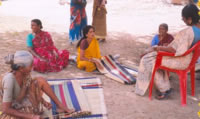 This village is well known for mats. From this place, they are supplying mats to many other places. This group was formed in 2001, by the NGO, Rural Development Trust (RDT) and it comprises 12 members. In this village mostly women are involved in the mat weaving and the men are engaged in agriculture. Men procure the raw material from different places and also help the women in marketing of mats. This village is well known for mats. From this place, they are supplying mats to many other places. This group was formed in 2001, by the NGO, Rural Development Trust (RDT) and it comprises 12 members. In this village mostly women are involved in the mat weaving and the men are engaged in agriculture. Men procure the raw material from different places and also help the women in marketing of mats.
All the 12 members in the group are involved in mat weaving individually. But they procure the raw material collectively and share the costs involved including transport. The members are engaged in this activity for the whole day. Once in a month the male members go to Musiri and buy the semi finished mats. The women give finishing touches with or without designs and make them ready for marketing. They will get the raw material in lorry loads and divide among themselves.
They earn a net profit of Rs. 50,000/ year if the women are engaged in this activity more seriously. They can be trained on improved designs to get better prices. The women have been involved with mat weaving for generations. Many of the women members opined that they are fed up doing this activity and would like to take some alternate employment as that only would give them better prospects in life.
|
Nomadic Goat/Sheep Rearing: Kallakkottai Village
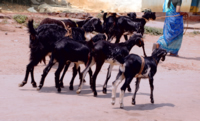 This is a family consisting of 4-5 members moving with their sheep to the nearby villages. They are nomadic tribes not belonging to a particular region. They own 75 sheep. They move to different places along with their sheep and stay for sometime and then move to another place.They leave the animals for free grazing. They give vaccinations to the animals twice in a year. The animals are left in the agricultural fields before sowing in the next season for days together, like a stall feed system of rearing. The excreta is then used as manure on the field and the land owners give money for the goat/sheep keepers depending upon the number of days. This is a family consisting of 4-5 members moving with their sheep to the nearby villages. They are nomadic tribes not belonging to a particular region. They own 75 sheep. They move to different places along with their sheep and stay for sometime and then move to another place.They leave the animals for free grazing. They give vaccinations to the animals twice in a year. The animals are left in the agricultural fields before sowing in the next season for days together, like a stall feed system of rearing. The excreta is then used as manure on the field and the land owners give money for the goat/sheep keepers depending upon the number of days.
After a specific period of time they move to the next place. At the end of 3-4 years they sell the adult goats/sheep. To look after the animals they engage 3-4 labors of that place and they are paid wages on a daily basis. In certain cases, the family members are taking care of the job. For veterinary assistance they spend nearly Rs. 12,000/year for all the animals. They get an income of Rs. 15,000/year by sale of animals and manure. They have been doing this activity for generations.
Rope manufacturing from Agave- Santhana Mullai Group-Aravampatty Village
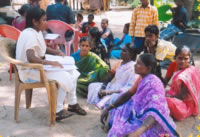 The group was formed by Rural Development Trust, a voluntary organization from Gandarvakkottai in 2002. Some of the members own land and some members are agricultural labourers. The group was formed by Rural Development Trust, a voluntary organization from Gandarvakkottai in 2002. Some of the members own land and some members are agricultural labourers.
All the members together procure the raw material and share them among themselves. The men go to procure the material and the women are fully engaged in rope manufacturing. They procure the agave fibre (raw material) from Thuvakudi of Ariyalur district. They collect the fibre from bushes and wastelands free of cost. But they have to bear the transport cost from the place of collection to their village. For one time transport they have to spend Rs. 6000/ which will be shared by the members of the group. They have set up the unit near their fields and do the work. Daily they go to the nearby town and gave the finished products to the shops.
They did not undergo any proper training to undertake this activity. Marketing is a major problem here. The commission agents buy from these members at a lesser price and they sell the same for a higher price. The members will be benefited more if some sort of mechanism could be developed to run this activity as a profitable enterprise. The women are cultivating vegetables based on their own experience. According to them, they can earn Rs. 3000/ (excluding the cost of their labour), if they invest Rs. 1,000/ in this enterprise, But the group needs support for building this as a sound enterprise.
Banana Cultivation as a group activity- Periakkottai Village
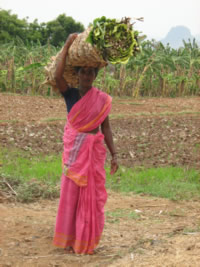 This group called Nal udhayam is formed by Pudukkottai Multi purpose Social Service Society (PMSSS), a voluntary organization working in Pudukkottai district. There are 10 members in this group. They started cultivating the banana very recently. They are yet to take up the first harvest. The group took 2 acres of land on lease (for Rs. 1,00,000) and obtained a bank loan to initiate this enterprise. After paying the lease amount for 2 acres they have spent the remaining amount on the land preparation, planting, fertilizers and for other inputs. The crop is not ready for harvest. Now it is in the stage of fruit formation.
All the members of the group work in the fields sharing the labour. The profit would also be shared after repayment of loan. The venture would be more profitable if they are exposed to proper cultivation aspects of banana. They also need training on development of value added products.
The women want to continue doing this enterprise until they gain profit. If they don’t have work in the banana fields they go for agricultural labour work in other places. They are planning to find a market for their produce in neighbouring towns like Trichy, Thanjavur etc.
|
Major findings of the focus group discussions
Despite the fact that some rural enterprises such as sericulture, dairying, goat rearing, chick rearing, vegetable production and rope making, provide income to rural women, they face several constraints in managing these enterprises. Most of these activities are performed as individual activity. Women especially the poorest do not have access to the right package of support (technical, financial, logistical and marketing and business) to ensure that these activities remain successful.
It is evident from the examples that what is missing from the activities is a network and convergence of support that provides more than just technical training. Technical training is also important, but what is clearly needed is a total hand-holding approach that also includes an integrated set of support and services (including technical support). These cases clearly reveal that a new and radical approach to reaching rural women is required on the ground. This should be based on a clear identification of the women profile (activity profile) and their support requirements.
Government, NGOs and private sector all have a role to play in reducing rural poverty, especially among rural women, but the analysis on the density of funding and penetration of programmes on the ground revealed that this is extremely low. In other words, there is a need for adequate support (funding and need based programme development), if the programmes targeted for women have to make a difference.
Feedback from the community also indicated that there was a total lack of awareness on the different programmes implemented by different agencies. This is another indicator that the programmes have not penetrated to the grass roots level. Many of the programmes only reach the selective and better off farmers.
Enterprise Building
It would appear that the type of support required by the groups is as follows:
| Enterprise Building: Required types of support |
- Opportunity identification; mainly through scanning the environment, particularly markets; identifying gaps in demand and supply (with attention to quality, costs, prices); observation of wider markets and linkages
- Identification of individuals and groups with potential to develop and exploit a given opportunity (by project and partner NGOs)
- Market & competition analysis, intelligence and marketing support.
- Enterprise feasibility analysis – technical, commercial and social.
- Stakeholder development; a network of positive stakeholders needs to be built up around each enterprise - people and institutions that gain from its success. These could be suppliers of material, service providers like transporters or banks/government officials/NGOs who get credit for successful enterprise development.
- Institutional options; evaluation and development (including linkages) of the most appropriate institutional vehicle for a given enterprise, with attention to legal and regulatory realities, capacitates of people involved. SHGs, partnerships, co-operatives, societies and more recently private limited companies are the most common, each with advantages and limitations.
- Mobilisation of human resources and development of human/ social capital. This includes skills & knowledge (technical, managerial, co-operative).
- Mobilisation of (non-financial) material resources.
- Mobilisation of financial resources (by project and partner NGOs)
- Formulating business plans & strategies.
- Risk analysis & contingency planning.
- Monitoring & review systems
- On-line management support: in production, marketing, financial management; particularly ‘troubleshooting’.
Source: CIRRUS MANAGEMENT SERVICES PRIVATE LIMITED, BANGALORE |
Women from the villages see no benefit or value or relevance in existing programmes or through current approaches. They clearly articulate the demand for programmes on sericulture, dairying, goat rearing, chick rearing, vegetable production and rope making etc but are unable to concretise their ideas for programme design.
These sets of ideas will be portrayed at a series of workshops intended for programme and project designers from government, NGO and private sectors. |
|
|
|
